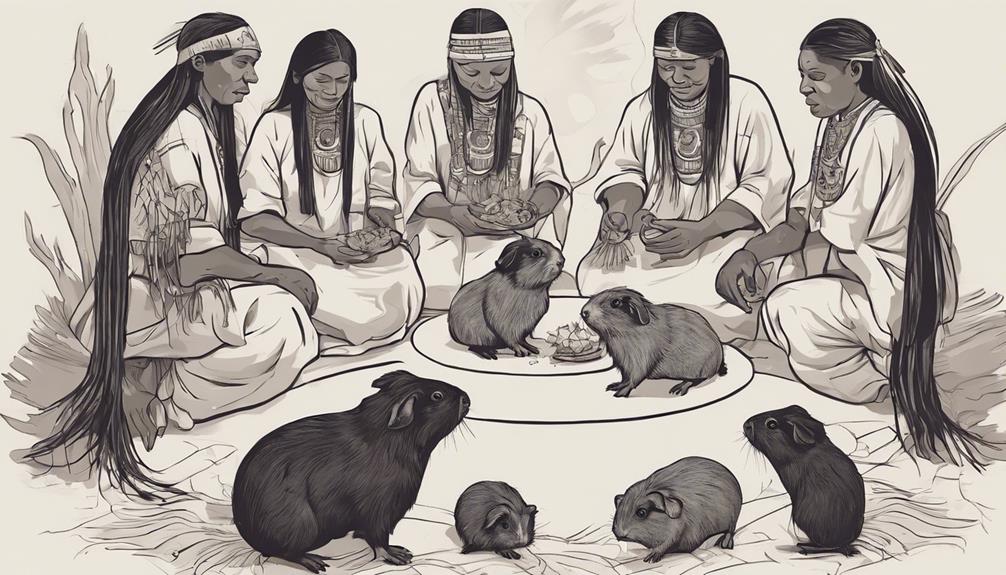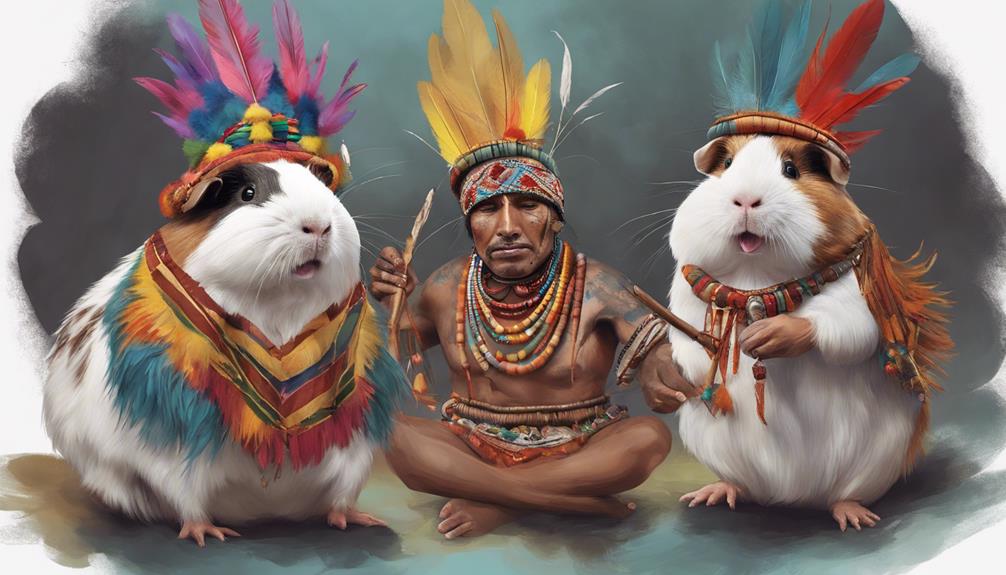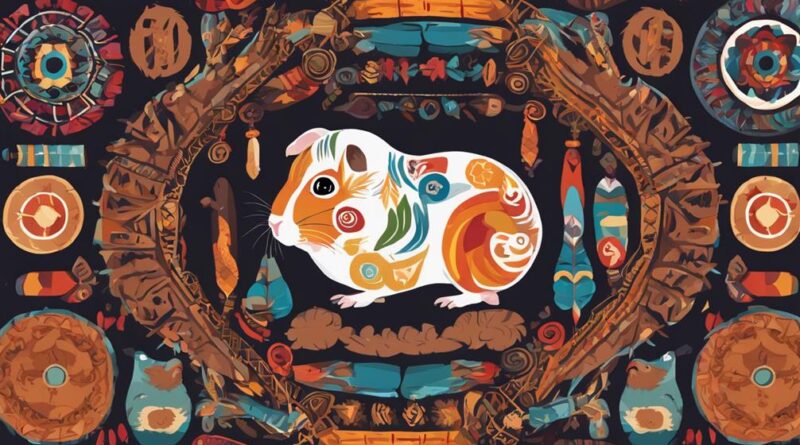Exploring Guinea Pig Significance in Indigenous Cultures
You might be surprised to find that guinea pigs have played diverse and intriguing roles in various indigenous cultures throughout history. From being symbols in art to their involvement in healing practices, these small creatures hold significant importance beyond what meets the eye.
As we explore the multifaceted significance of guinea pigs in traditional medicine, rituals, ceremonies, and folklore among indigenous communities, you will uncover a rich tapestry of beliefs and customs that intertwine with these beloved animals.
Ancient Guinea Pig Domestication
Ancient civilizations across South America actively domesticated guinea pigs for their valuable contributions to daily life and sustenance. These small creatures weren't only kept for their meat but also played a significant role in companionship and spiritual practices. In ancient times, guinea pigs weren't just livestock but cherished companions that provided warmth and comfort to their owners.
The domestication of guinea pigs in ancient South America was a sophisticated practice that involved selective breeding and careful agricultural considerations. Indigenous communities bred guinea pigs for specific traits, such as size, color, and fur type, to meet their diverse needs. These practices led to the development of various breeds tailored to different purposes, be it for meat, rituals, or even as pets. The agricultural practices surrounding guinea pig rearing were intertwined with the culture and beliefs of these civilizations, highlighting the deep connection between humans and these animals.
Guinea pigs were more than just a food source; they held spiritual significance in many indigenous cultures. These creatures were often used in rituals and ceremonies, symbolizing fertility, abundance, and even acting as oracles in some traditions. The bond between humans and guinea pigs went beyond mere practicality, encompassing a profound spiritual connection that enriched the lives of ancient South American societies.
Guinea Pig Symbolism in Art
Symbolically depicted in various forms of art, guinea pigs hold significant cultural meanings in diverse artistic expressions. Artists throughout history have used guinea pigs as symbols to convey various messages and themes. Here are some ways in which guinea pigs are interpreted in art:
- Fertility and Abundance: In many indigenous cultures, guinea pigs are seen as symbols of fertility and abundance. In art, they're often depicted surrounded by bountiful harvests or large litters of young, representing prosperity and growth.
- Connection to the Spirit World: Some artistic representations of guinea pigs symbolize a connection to the spirit world. They're believed to act as messengers between the earthly realm and the spiritual realm, depicted in art through ethereal backgrounds or mystical settings.
- Family and Community: Guinea pigs are frequently used in art to symbolize the importance of family and community. Artistic interpretations often show guinea pigs huddling together in unity, emphasizing the values of togetherness and support within a group.
- Protection and Good Fortune: In certain cultures, guinea pigs are considered symbols of protection and good fortune. Artists incorporate them into various artworks as talismans or charms, believed to bring luck and safeguard against harm.
Guinea Pigs as Sacrificial Offerings

Guinea pigs in indigenous cultures have been historically utilized as sacrificial offerings in rituals and ceremonies. The ritual significance of guinea pigs as sacrificial offerings is deeply rooted in the cultural beliefs and practices of these communities. These small animals hold a special place in ceremonies, symbolizing purity and fertility.
In many indigenous cultures, guinea pigs are considered sacred beings and are offered as cultural offerings to appease deities or spirits. The act of sacrificing a guinea pig is believed to bring about blessings, protection, or a successful harvest. The ritualistic sacrifice of guinea pigs is seen as a way to communicate with the spiritual realm and seek guidance or favors.
The practice of using guinea pigs as sacrificial offerings is a tradition that has been passed down through generations, with specific rituals and ceremonies dictating how the sacrifices are to be conducted. The cultural significance of these offerings isn't taken lightly, as they're seen as a way to honor ancestors, gods, or nature spirits. Guinea pigs play a crucial role in the spiritual and cultural life of indigenous communities, serving as a bridge between the earthly and divine realms.
Guinea Pig Healing Practices
Healing rituals involving guinea pigs have been integral to traditional indigenous practices, embodying the deep connection between spiritual beliefs and physical well-being. In many indigenous cultures, guinea pigs are revered for their role in healing ceremonies, where their presence is believed to facilitate a spiritual connection that aids in restoring balance and harmony to the individual.
Here are some key aspects of guinea pig healing practices:
- Spiritual Connection: Guinea pigs are seen as mediators between the physical and spiritual realms, acting as conduits for healing energies to flow through during ceremonies.
- Healing Ceremonies: These ceremonies often involve intricate rituals led by shamans or spiritual leaders who harness the guinea pig's energy to promote healing and wellness in the participants.
- Shamanic Practices: Shamans play a vital role in guinea pig healing practices, using their knowledge of the spirit world to guide the ceremonies and channel healing energies.
- Ancestral Teachings: The use of guinea pigs in healing practices is deeply rooted in ancestral teachings passed down through generations, highlighting the importance of tradition and cultural heritage in indigenous healing rituals.
Guinea Pig Rituals and Ceremonies

Rituals and ceremonies involving guinea pigs hold a pivotal role in indigenous cultural practices, embodying centuries-old traditions and spiritual connections. In many indigenous communities, guinea pig culinary traditions are deeply intertwined with cultural beliefs. These small animals aren't only a source of sustenance but are also considered sacred in various rituals.
Guinea pig fertility rituals are common in indigenous cultures, symbolizing abundance, prosperity, and the cycle of life. During these ceremonies, guinea pigs are often used as offerings to deities or spirits believed to influence fertility. The act of offering these animals is deeply rooted in spiritual connections and the belief in their ability to bring blessings of fertility to the community.
In some cultures, guinea pigs play a central role in ceremonial practices, where their presence signifies purity and spiritual protection. These ceremonies often involve elaborate rituals where guinea pigs are adorned with symbolic decorations and released into nature as a gesture of gratitude and reverence.
Guinea Pigs in Traditional Medicine
Indigenous cultures across the world incorporate guinea pigs into traditional medicine practices as a means of holistic healing and spiritual connection. These furry creatures hold a special place in the realms of traditional remedies and cultural beliefs, playing essential roles in the health and well-being of individuals within these communities.
Four Intriguing Ways Guinea Pigs are Utilized in Traditional Medicine:
- Healing Poultices: Guinea pig fur is believed to possess healing properties in some indigenous cultures. By creating poultices with herbs and guinea pig fur, ailments are thought to be drawn out of the body, promoting faster recovery and well-being.
- Spiritual Cleansing: In certain traditions, guinea pigs are used in rituals for spiritual cleansing. It's believed that the purity and innocence of these animals can absorb negative energies, providing a cleanse for the individual seeking spiritual balance.
- Symbolic Representations: Guinea pigs are often seen as symbols of good luck and protection. Incorporating them into traditional medicine practices is believed to bring positive energy and ward off illnesses.
- Energetic Balancing: Through the use of guinea pigs in traditional medicine, practitioners aim to balance the energies within a person's body. It's thought that the gentle nature of guinea pigs can help restore harmony and equilibrium to the individual's spiritual and physical well-being.
Guinea Pig Communication in Cultures

Guinea pigs, beyond their roles in traditional medicine, also serve as unique communicators within various cultures, fostering connections and understanding through non-verbal means. Cultural beliefs play a significant role in how guinea pig communication is interpreted in different indigenous communities. In some cultures, guinea pigs are seen as messengers of important information from the spiritual world. The behavior of these animals is closely observed and believed to convey messages about upcoming events or changes in the environment.
Within indigenous languages, guinea pigs hold symbolic meanings that are deeply intertwined with communication. For example, in certain communities, the sounds made by guinea pigs are thought to represent specific emotions or intentions. This understanding of guinea pig vocalizations allows for a form of communication that transcends verbal language barriers. People in these cultures have developed a keen sensitivity to the subtle cues given by guinea pigs, enabling them to understand and respond to the needs of these animals effectively.
Through these cultural beliefs and interpretations within indigenous languages, guinea pigs serve as silent but powerful communicators, facilitating connections between humans and the natural world. Their role in communication goes beyond mere companionship, enriching the cultural tapestry of these communities with a unique form of non-verbal interaction.
Guinea Pig Role in Folklore
Throughout the centuries, folklore from various cultures has woven intriguing tales involving the guinea pig. These small, adorable creatures haven't only captured the hearts of many but also have significant roles in folklore and indigenous beliefs worldwide. Here are four fascinating aspects of guinea pig roles in folklore:
- Divine Messengers: In some folklore tales, guinea pigs are portrayed as messengers of the gods, carrying important messages between the human world and the spiritual realm. Their small stature and innocent appearance make them ideal candidates for delivering divine communications.
- Luck and Prosperity: Indigenous beliefs in certain cultures associate guinea pigs with luck and prosperity. It's said that having a guinea pig in your home can bring good fortune and abundance to the family. Some even believe that the squeaks and movements of guinea pigs can predict future events.
- Guardians of Children: In folklore from South America, guinea pigs are often depicted as guardians of children, watching over them as they sleep and keeping them safe from harm. Parents would place a small figurine of a guinea pig near their child's bed for protection.
- Symbol of Fertility: In some cultures, guinea pigs are symbols of fertility and abundance. Couples hoping to have children may keep guinea pigs as pets or use guinea pig imagery in fertility rituals to increase their chances of conception.
Frequently Asked Questions
Do Indigenous Cultures View Guinea Pigs as Pets or Solely for Practical Purposes?
In many indigenous cultures, guinea pigs serve both as pets and for practical purposes. They provide companionship while also being utilized as a food source or in traditional ceremonies.
The cultural perceptions of guinea pigs vary, with some communities valuing them for their social aspect and others primarily seeing them as a resource. Overall, these small creatures hold diverse roles within indigenous societies, blending practicality with companionship.
Are There Specific Rituals or Ceremonies Dedicated to Guinea Pigs in Indigenous Cultures?
In many indigenous cultures, guinea pigs hold special significance beyond practical uses. They're often involved in rituals and ceremonies, representing cultural symbolism and spiritual connections.
These rituals can vary widely, from offerings and sacrifices to symbolic gestures of protection and fertility. Guinea pigs are valued members of the community in these cultures, playing a role in enhancing spiritual practices and fostering connections with the natural world.
How Do Guinea Pigs Play a Role in Traditional Medicine Practices?
In traditional medicine practices, guinea pigs often hold a significant role. They're believed to have a strong spiritual connection and are utilized for their healing properties. These small animals are commonly used in remedies and rituals to treat various ailments and promote well-being.
Guinea pigs are valued for their therapeutic qualities and are an integral part of indigenous cultures' healing traditions, showcasing the importance of these creatures in spiritual and medicinal practices.
Are There Any Specific Healing Practices Involving Guinea Pigs That Are Unique to Indigenous Cultures?
In some indigenous cultures, guinea pig healing practices hold special significance. They're believed to have unique powers that aid in spiritual and physical healing. These practices are deeply rooted in indigenous beliefs, where guinea pigs are seen as sacred animals capable of transferring positive energy to individuals in need.
Through rituals and ceremonies, the healing properties of guinea pigs are harnessed to restore balance and well-being to those seeking help.
How Do Guinea Pigs Communicate With Humans in Indigenous Cultures, if at All?
In indigenous cultures, guinea pigs communicate with humans through various behaviors and sounds. People believe these interactions hold spiritual significance, fostering a deep connection between humans and animals.
Through cultural beliefs, guinea pigs are seen as messengers or symbols of certain qualities like luck or protection. This unique form of animal communication enriches the bond between humans and guinea pigs, enhancing the spiritual connections within indigenous communities.
Conclusion
As you reflect on the significance of guinea pigs in indigenous cultures, it becomes clear that these small creatures have played a variety of important roles throughout history.
From being domesticated for food and companionship to serving as symbols in art and rituals, guinea pigs have been deeply woven into the cultural fabric of many societies.
Their presence in traditional medicine and communication practices further highlights their unique importance in indigenous communities worldwide.
